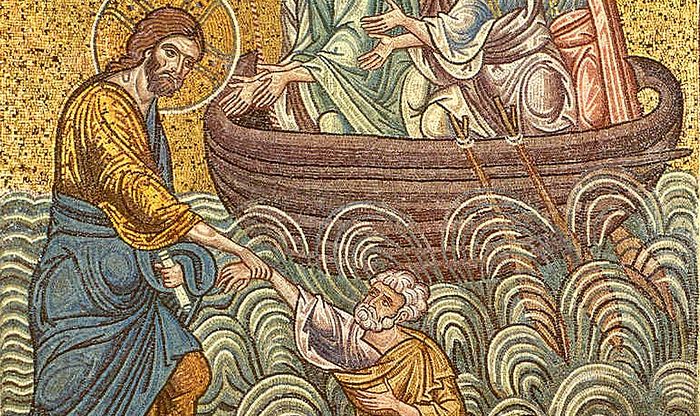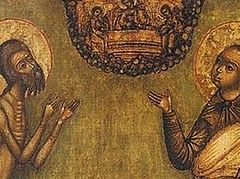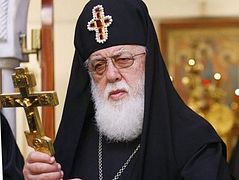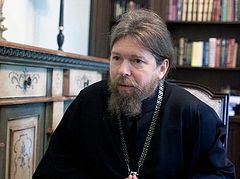I Corinthians 3:9-17; Matthew 14:22-34
Sometimes we fall into the trap of thinking that we are totally self-sufficient and able to live exactly as we please with no serious consequences. Self-reliance, independence, and freedom certainly have their places, but they also have their limits and must be kept in proper perspective. We must develop these qualities in light of who we are before God, if we are to flourish as His beloved sons and daughters.
That is precisely what Peter did not do in today’s Gospel reading, however. As he miraculously walked on the water with Jesus Christ, he did not accept the reality of who he was in relation to the Lord. He turned his trust away from the One Who was enabling him to do what he could never do on his own, to walk on the water. Instead, he focused on the wind and the waves and his own weakness, and began to sink. It had apparently not sunk into Peter’s mind that he was walking on the waves purely because the Son of God had enabled him to do so. As he turned away from trusting the Lord and relied only on himself, he began to sink like a stone. As we all know, that is simply the reality of what happens to a human being who tries to walk on the water by his own power.
Something similar would happen to a building that was not squarely grounded on a solid foundation. It would collapse under its own weight. As St. Paul reminded the Corinthians, our one true foundation in life is the same Son of God Who spoke the universe into existence, became the Second Adam to restore our corrupt humanity, and Who conquered death in His third-day resurrection. He is the very basis of our existence and our hope for salvation.
Whenever we use our freedom as an excuse to turn away from Him and to trust only in our own desires and abilities, we turn away from our true selves. We cut ourselves off from the truth, reality, and power that are necessary for us to flourish as those created in the image and likeness of God. If we are honest, we will see that it does not take much at all to put us in our place, to show us that living by our own designs is a path that leads only to weakness and despair. That is why Peter started to sink when he focused more on the stormy sea than on the Lord. Our ultimate choice, which we make every moment of our lives, is whether to entrust ourselves to the merciful, transformative power of the Savior. He alone provides the path to true freedom from slavery to our passions and ultimately from death.
It is no accident that Peter’s fear in that moment was focused on death. He was a fisherman and knew that someone in his situation was about to drown, but he at least had the presence of mind to call out “Lord, save me.” The circumstances that we face due to our lack of faith may not be quite so clear, but the meaning is the same. When we step away from the one true foundation, we choose the pain of death instead of the joy of the empty tomb. When we nourish hate and anger toward others, we murder them in our hearts. When we embrace lustful thoughts, we enslave ourselves to immoral desires and commit adultery. When we refuse to forgive others, we harden our hearts and make it impossible to accept God’s forgiveness for our own sins. When we do not serve our neighbors in need, we disregard the Lord Himself. No, we do not have to do anything nearly as dramatic as Peter did in order to start sinking into the depths.
Of course, some will justify drowning in sin in the name of being true to themselves. Here is where Orthodox Christianity insists that human beings are not mere bundles of freedom who are made to find fulfillment wherever and however they happen to desire. Instead, the Lord has made us in His image and likeness. It is our very nature to be united with God in holiness. Unfortunately, our common corruption has gravely distorted our ability to fulfill that righteous vocation. That is why we so easily worship money, power, pleasure, and getting our own way. It is why we so easily make success in the world on our own terms a false god. And even as we become more and more enslaved to our self-centered desires and illusions, we may truly believe that we are doing the right thing. That is simply a sign that we are diminishing ourselves even further.
In this light, we must all seriously discern whether we are really being true to ourselves as those created in God’s image and likeness and whose one true foundation is Jesus Christ. Are we being true to ourselves as God’s temple in whom the Holy Spirit dwells? Are we being true to ourselves as those who have put on Christ in Baptism and who are nourished by His Body and Blood in Holy Communion? If not, then we are living a lie that puts major roadblocks between us and the holy joy that it is our nature to seek.
When Christ enabled Peter to walk on the water, He gave us an icon or image of what it means to share in His life by grace. He showed us that human beings may participate already in His victory over sin and death, that in Him we may know a blessed freedom that enables us to overcome even the darkest and most powerful temptations. As we grow in personal union with our risen Lord, He heals us from corruption and empowers us for a life of holiness. In Him, we find infinitely greater fulfillment than in a life of slavery to our self-centered desires and illusions. That is what it means for us to walk with Him across the stormy seas of our lives.
St. Paul reminded the Corinthians that they were “God’s fellow workers; God’s field, God’s building.” If the workers on a building site become careless and do not ground the structure on its foundation, the project will likely collapse. The same is true of us. We must all wrestle with the question of whether we are cooperating with the Lord as we build the project of our lives. He calls us to be His holy temple, and we must all resist the temptation to become distracted from fulfilling that high calling. A temple is a place where we offer ourselves to God in holiness. That is the most fundamental calling of our lives which fulfills God’s purposes for creating us in the first place. It is only by offering ourselves for union with Christ in holiness that we become participants in the eternal life and blessedness for which He brought us into existence.
Let us use our freedom to become God’s fellow workers in making ourselves holy temples. Let us embrace the divine power that enables us to walk across the stormy seas of our lives, even to share in the Savior’s victory over sin and death. We will be able to do so only when we embrace personally the glorious truth that our nature and purpose is to grow in holiness and union with the Lord. Anything less is a path to the despair of sinking like a stone or collapsing like an ill-constructed building under its own weight. True freedom comes in accepting who we are in God’s image and likeness, His beloved sons and daughters, and living accordingly.




